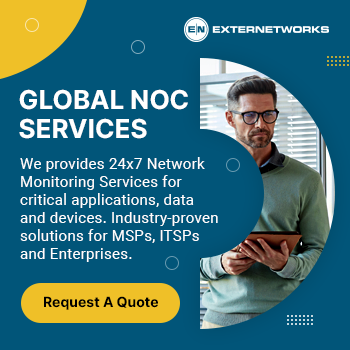What is a Managed Services Provider (MSP)? How it can Help Your Business?

To stay competitive in business, you need to play to your strengths and minimize risk. Bringing services in-house can cut costs in some situations–but outsourcing can be more advantageous in others. Initial outlay costs, specialized labour, scalability concerns, and an ever-changing technical environment are just some of the reasons companies benefit from outsourcing their IT functions.
Many of today’s most successful companies are leveraging their technical infrastructure demands through a Managed Services Provider (MSP). In this article, we’ll explain what a managed services provider MSP is and how they work—and, most importantly, how they can reduce risk and save money for your business.
What is a Managed Services Company?
A Managed Service Provider (MSP) is a company that specializes in managing IT functions for remote customers. A MSP can offer many different solutions, but their basic service is managing a company’s servers and proprietary applications, including network monitoring and NOC support.
The earliest IT managed service offering was by Application Service Providers (ASPs) during the 1990s, which provided offsite access to specific IT functionality using an installed client-side interface on local machines. As networks grew and server operations became more complex, MSPs grew to manage more of a company’s IT infrastructure remotely.
This MSP model has since grown to include security and network management, along with related offerings like onsite support and data monitoring. Most recently, MSP’s have begun to provide enhanced mobile device management and advanced network operations and their menu of solutions are still expanding.
What does an MSP do?
We can now answer, “What is a managed services company?” but what does it do? A competent MSP can solve your server and storage issues and extend your IT capacity—but that’s only the beginning. Here are other common services provided by MSPs.
- System Security
- Firewall administration
- Data backup and recovery
- Data storage and management
- Help Desk services
- Router management and monitoring (WAN and LAN)
- WiFi installation and maintenance
- Onsite support
- Internet of Things (IoT) solutions
MSPs mainly provide internal company support, acting as an arm of your business operations. They don’t normally interface with your customers or outside entities.
The Managed IT Services Model
There’s a lot of talk about the managed IT service model. It’s a simple concept, but you can easily get lost in the jargon. A short background on how the model developed will illustrate the idea.
How We Got Here?
Initially, IT services used a traditional “break fix” model, under which services are performed when needed and billed accordingly. The limitation of this approach is that it isn’t proactive, but only acts when a problem occurs. This model can work for copier breakdowns or light construction projects, but it isn’t effective in the interconnected, real-time environment of IT production.
A second IT service model is “on-demand” usage, in which clients pay only for the number of transactions made or other agreed-upon metric. This provides scalability and other advantages of remote IT management, but it has limitations too. This model’s focus is to streamline transactions, which can lead to vanilla configurations and lack of customization. Each individual customer becomes less important too, and your costs continue to add up without residual assets being gained.
The Managed IT Services Model
The offerings of prior ASP vendors and other remote-access providers have expanded to become today’s full-service MSP. The service level agreement of a MSP is a customized form of outsourcing, and most providers offer a subscription model to tailor services to their customers. Specific IT functions are contracted out to the MSP, which handles those tasks independently and works to proactively manage operations.
A MSP partner frees companies from the intense and multiple demands of their business’s technical infrastructure and computer processes, while providing them with knowledgeable IT planning and response. This model has proven successful, and is still growing and evolving.
The nature of the Managed IT Services model means it is not a one-size-fits-all offering, so it’s not possible to give individual guidelines. To find the right solution, it’s important to understand the benefits and trade-offs of using MSP services, and how they can work for your business.
How a MSP can Improve Your IT Operations
Virtually all enterprise-level companies have engaged MSPs to optimize operations and gain the benefit of expertise outside their core competency. Not every company will need the same mix of services or degree of integration. It only makes sense to know what is offered, however, so you can identify areas of your business that might take advantage of those services.
Because managed IT services offer such concrete, bottom-line benefits to companies, the range of IT functions managed by MSPs are still expanding. The following are some reasons a reputable MSP can help improve your IT operations.
Low initial outlay – MSPs can provide necessary IT infrastructure instantly, allowing a business to avoid high start-up costs.
Professional workforce – Highly trained and specialized workers are required for IT performance, a difficult demand that is not part of your core business.
Scalability – MSPs can provide instant ramp-up and scale back of capacity without major restructuring or risk.
Resource Network – Established MSPs interact with technical resources across the industry, and can leverage these contacts for their clients as needed.
Specialized knowledgebase – MSPs can provide expertise on technical issues and trends which the main business lacks.
Service Optimization – MSP services provide companies with the flexibility to optimize operations with a mix of in-house and outsourced functions.
Managed Security Services – MSPs have the experience and skills needed to manage the critical issue of IT security.
Disaster recovery – MSPs have the ability to help businesses quickly recover from unforeseen IT disasters and ensure business continuity. This is an important backstop, because time is critical in technical disruptions, and doing the wrong thing can lead to even worse outcomes.
Why Enterprises Need MSP Services, and How ExterNetworks can Help
Enterprise-level companies have partnered with MSPs for greater efficiency and lower costs. It is important to understand why business need MSP services, so you can identify areas of your own business that might find competitive advantage.
With a competent MSP handling your IT functions, you are ready to take adv of opportunities quickly with less risk. The scalability of MSP services means you can hit the ground running and cut back as needed, and can easily stay current with technology trends so you aren’t left behind.
ExterNetworks has experience assisting companies of all sizes, so they understand the IT needs of your business. As a full-service MSP, they offer a menu of services that you can customize to the needs of your business. An established partner like ExterNetworks can help you “right-size” your IT capacity to better serve your customers and plan for the future.
Summing Up
Since the earliest days of managed software applications, MSPs have grown to help businesses manage their increasing IT needs. Finding a reputable provider can reduce initial costs and allow your business to punch above its weight.
ExterNetworks works with their clients as partners in finding the best solution for each organization. Whether you’re looking to optimize an existing in-house IT setup or begin a new chapter, finding a reputable MSP, such as ExterNetworks, can help you maximize operations and future-proof your business.





